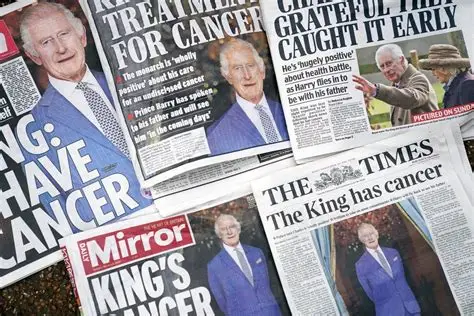In 2024, Buckingham Palace revealed that King Charles III had been diagnosed with a form of cancer discovered during treatment for an enlarged prostate. The official statement confirmed it was not prostate cancer, leaving the exact type undisclosed.
This marked the first time in modern royal history that a reigning monarch openly shared a cancer diagnosis, showing a new level of transparency and courage from the royal family.
Despite the shock, the King immediately began treatment and remained optimistic — balancing medical care with his constitutional responsibilities.
2. The Public and Global Reaction
The announcement sent waves of concern through the UK, Commonwealth nations, and royal watchers worldwide. Public figures, including Prime Minister Rishi Sunak and U.S. President Joe Biden, expressed support for the monarch.
Many praised King Charles for breaking the silence around male health issues, with his honesty encouraging more men to undergo cancer screenings early.
3. The Type of Cancer: Medical Speculation and Clues
Though the palace hasn’t disclosed details, medical experts suspect it could involve the bladder, colon, or lymphatic region, given that it was found during prostate checks.
Regardless of the type, what’s certain is that the cancer was caught early, and early detection remains the strongest factor improving life expectancy and recovery rates.
4. King Charles’ Treatment Plan and Recovery Journey
According to reports, King Charles has been receiving regular treatments, likely involving targeted therapy and chemotherapy. He continues to fulfill some duties remotely, showing that his condition is under control.
Queen Camilla has played a vital supportive role, while Prince William has taken on additional royal responsibilities.
The King’s positive attitude and early intervention have fueled optimism about his long-term prognosis.
5. Expert Predictions: King Charles Cancer Life Expectancy
While predicting an exact timeline isn’t possible without full medical details, experts emphasize encouraging signs:
-
The cancer was likely diagnosed at an early stage.
-
His medical team is among the best in the world.
-
Lifestyle factors — including diet, fitness, and stress management — all support healing.
Modern treatments mean many cancers today have survival rates exceeding 80–90% when detected early. This makes King Charles’ life expectancy outlook positive, according to health specialists.
6. The Emotional Impact on the Royal Family
The diagnosis has strengthened the family’s unity. Prince William continues to prepare for future leadership, while Prince Harry made an emotional visit to see his father in the early days of treatment.
Queen Camilla’s unwavering presence at public engagements also reflects the monarchy’s resilience and stability during this personal challenge.
7. How King Charles Balances Duty and Health
Even while in treatment, the King has remained engaged in key constitutional roles — meeting with the Prime Minister, attending virtual briefings, and issuing royal messages.
This balance between service and self-care reinforces his commitment to the Crown and boosts public respect for his dedication.
8. The Historical Context: Royals and Health Challenges
Royal health has long been a private matter. From Queen Elizabeth II’s mobility struggles to Prince Philip’s surgeries, the family has traditionally remained discreet.
King Charles’ openness represents a modern shift — one that humanizes the monarchy and promotes health awareness across generations.
9. Future Outlook: A Hopeful Path Ahead
As of 2025, all indicators suggest King Charles is responding well to treatment and maintaining stability.
Palace sources report that he remains “energetic, focused, and hopeful,” signaling that his life expectancy remains strong and that he could continue leading the monarchy for years.
This episode, though difficult, may ultimately enhance the King’s public image — portraying him as a symbol of endurance and modern leadership.
10. Conclusion
The discussion about King Charles’ cancer life expectancy is not only about a monarch’s health — it’s a reflection of hope, medical progress, and human resilience.
The King’s journey reminds the world that even figures of great power face life’s toughest battles with courage and dignity. With continued treatment and support from his family and people, King Charles III stands as a beacon of strength for millions who face similar struggles.

